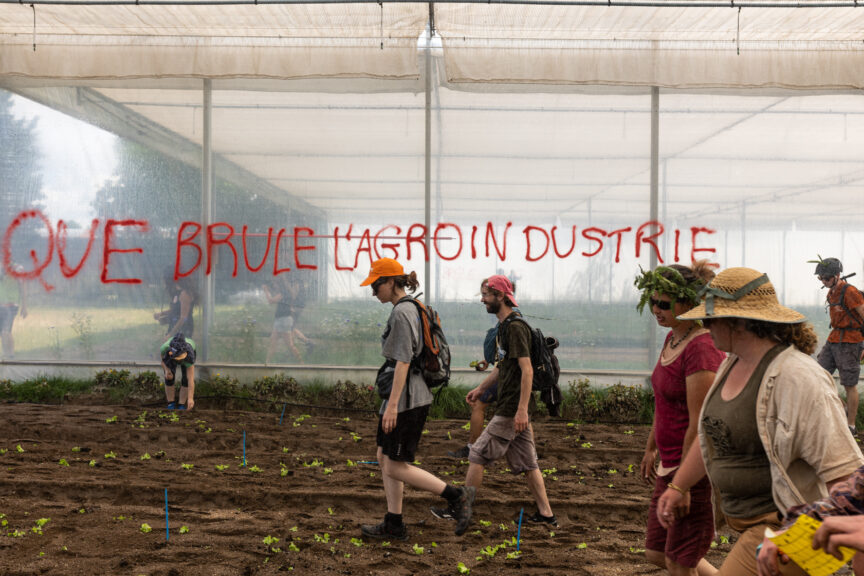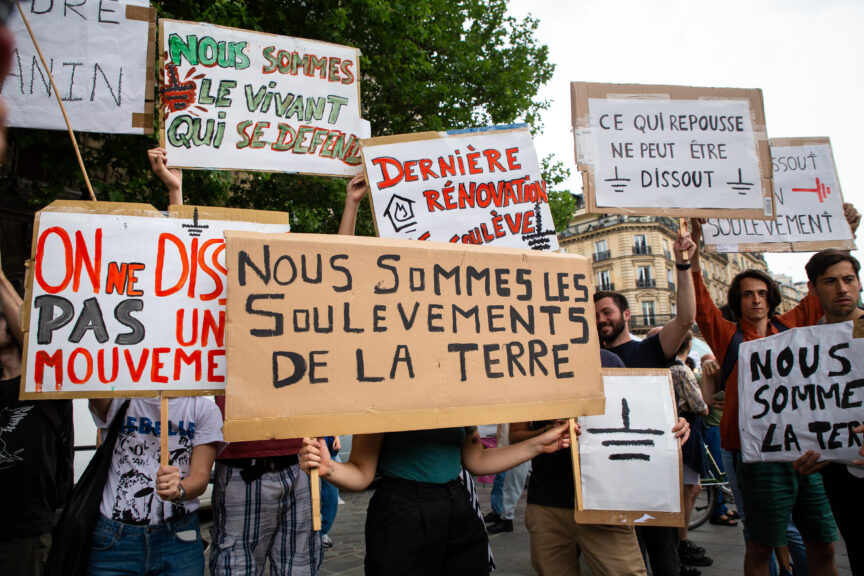French Climate Activists Are Waging War Against Water Hoarders

“Last summer, anti-drought actions multiplied. This summer, activists will act with even more fearlessness and creativity: cutting off hoarders’ water supplies, putting golf courses out of action, dismantling megabasins, squatting the swimming pools of the ultra-rich and the air-conditioned offices of their insurers, banging saucepans outside pool manufacturers offices, building beaver dams to revive our rivers and their banks. Our inventiveness must have no limits.”
This kind of activist communique follows two years of unseasonable drought across France. As of 30 June, 42 of France’s 96 mainland départements (administrative divisions) contain at least one area with water restrictions. 15 of these 42 are officially in crisis, meaning water usage is restricted to priority functions: health, civil security, drinking water and sanitation.
It’s no surprise, then, that French climate groups are escalating their tactics in the fight over water. In August last year during water restrictions in Vosges in eastern France, activists drilled holes in jacuzzis at a holiday resort. Over the winter, others sabotaged artificial snow canons at Clusaz, south-eastern France, while others set up a ZAD (autonomous zone) in the area, citing the winter drought as their motivation.
The most contentious of these groups is Les Soulèvements de La Terre, or ‘Earth Uprising’, which is currently waging 100 days of action against “water hoarders” across the country. In response, the French state is cracking down on so-called eco-terrorism – and hard.
Back to the land.
Earth Uprising’s aim is to “take ecologism back to the land”, spokesperson Basile explains to Novara Media. “When we talk about climate change, it can feel like something that’s very far away,” he says. “But defending agricultural land, the green spaces where we live, that’s very tangible.”

In recent months, this rationale has led Earth Uprising to fight against “concretisation”, as concrete production is water intensive. In December, the group targeted concrete production firm Lafarge in Bouc-Bel-Air in southern France. 200 activists broke onto the site, attacking equipment with hammers and axes and setting light to vehicles. Notably, Basile explains, Lafarge wasn’t just targeted for its concretisation plans, but for funding Islamic State in Syria.
Earth Uprising also targets agribusiness, blockading Monsanto sites and attacking megabasins – large, man-made reservoirs which store water for agricultural use, filled by pumping water from the water table in the winter months.
In March, 30,000 people descended on a megabasin construction site in Sainte-Soline in western France, sabotaging the pumps. When the police fired grenades and teargas into the crowd, the crowd fought back. 5,000 grenades were used over the course of a few hours, and by the end of the day, hundreds of protesters and dozens of police were injured.
“France is the only western democracy where maintaining order involves firing on the crowd with military grade weaponry,” Basile says. This can be seen from the state response to the gilets jaunes to the recent wave of protests following the killing by police of unarmed 17-year-old Nahel Merzouk.
“After Sainte-Soline, there were several people whose lives were hanging in the balance,” Basile continues. “It proves that the state is ready to kill to defend these construction sites.”
Defenders of the megabasins argue that these reservoirs allow farmers to maintain the production of cereals and seeds even during droughts. However, many experts disagree.
Francois, an activist who has been involved with anti-megabasin group Bassines Non Merci as well as Earth Uprising, argues that megabasins are inefficient because water that would have been protected underground evaporates off the surface of the basin in the sun. “It’s completely crazy,” he tells Novara Media.
Basile adds: “The megabasins are typical of maladaptation to climate change. They are an infrastructure which permits the hoarding by a tiny, agricultural capitalist section of society, of water which is a common good that belongs to all.”
Earth Uprising doesn’t use the word sabotage to describe its militant action. In French jurisprudence, sabotage denotes an attack on infrastructure that’s vital to the “fundamental interests of the nation”, Basile explains. “A cement production site or a megabasin is the opposite – it’s private infrastructure which puts the possibility of a living future on the earth in peril.” Instead, activists prefer the term “disarmament”.
Victor Cachard, author of A History of Sabotage, adds that this term is also a reference to the actions of the ecological movement in the US against the industries building weapons for the Vietnam War and later the Gulf War. “There was the idea among ecological activists to join their environmental struggle with their anti-war struggle, as they recognised that war pollutes,” he says.
State crackdown.
This escalation in tactics hasn’t gone unnoticed. Last month there was a wave of arrests of climate activists under counter-terror legislation brought in in response to Jihadism. During interrogations, activists were even asked if they liked the work of Andreas Malm, author of How to Blow Up a Pipeline, whose name has become a byword for trouble within the French security apparatus.
On 21 June, the government formally ordered the dissolution of Earth Uprising under counter-terrorism legislation. In the decree, the state argued the group “provokes acts of violence against persons and property”.

Cachard argues that the government has appealed to terrorism legislation because it’s afraid of what’s to come. “I read reports from a police bureau that suggested the growing power of the ecological movement is a cause of worry for the authorities,” he tells Novara Media.
According to terrorism researcher Dr Samuel Henkin, however, the conflation of criminal activities undertaken by climate activists – “sabotage, trespassing, destruction of property” – with terrorist violence is “extremely dangerous”. He explains that while climate activists may act outside the law, they generally lack the “terrorism-justifying ideology” that might put them on the pathway to violent extremism.
But the public reaction to the decree, however, is cause for hope. Though sometimes in tension, as in the case of the proposed Lyon-Turin train line, much of France’s parliamentary left (Europe Ecology – The Greens (EELV), La France Insoumise MPs and even some Parti Socialiste figures) has denounced the decree against Earth Uprising. Indeed, both Cachard and Francois argue that the movement’s genius lies in allowing its cause to be taken up by mainstream politics and the media while retaining its radical core. “It’s hard to criminalise Jean-Luc Mélenchon,” Francois notes.
Earth Uprising has so far resisted dissolution. Since the decree, hundreds of protests have been organised under the group’s name, while on 9 July, several unions and activist groups in Rennes declared – Spartacus-like – that they too were the Earth Uprising. It seems that as long as France suffers water shortages, climate activists will respond with action – and, in turn, the state will continue its repression. This is the new politics of drought.
Olly Haynes is a freelance journalist covering politics, culture and social movements.


